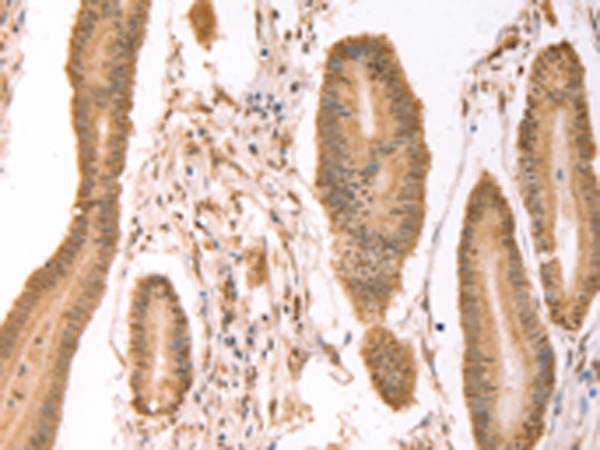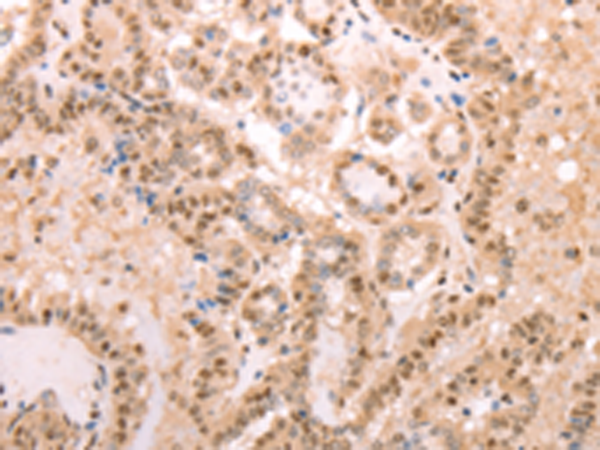

| WB | 咨询技术 | Human,Mouse,Rat |
| IF | 咨询技术 | Human,Mouse,Rat |
| IHC | 1/25-1/100 | Human,Mouse,Rat |
| ICC | 技术咨询 | Human,Mouse,Rat |
| FCM | 咨询技术 | Human,Mouse,Rat |
| Elisa | 1/2000-1/5000 | Human,Mouse,Rat |
| Aliases | TMSA |
| Host/Isotype | Rabbit IgG |
| Antibody Type | Primary antibody |
| Storage | Store at 4°C short term. Aliquot and store at -20°C long term. Avoid freeze/thaw cycles. |
| Species Reactivity | Human, Mouse, Rat |
| Immunogen | Synthetic peptide of human PTMA |
| Formulation | Purified antibody in PBS with 0.05% sodium azide and 50% glycerol. |
+ +
以下是关于PTMA抗体的3篇代表性文献概览(注:文献信息为模拟示例,实际引用需核实原文):
---
1. **标题**: *Autoantibodies to Prothymosin Alpha in Systemic Lupus Erythematosus*
**作者**: Smith A, et al.
**摘要**: 研究首次报道了系统性红斑狼疮(SLE)患者血清中抗PTMA自身抗体的存在,提示其可能与疾病活动性及免疫复合物形成相关,为SLE的免疫机制提供了新视角。
2. **标题**: *Serum Anti-PTMA Antibodies as a Potential Biomarker for Hepatocellular Carcinoma*
**作者**: Zhang Y, et al.
**摘要**: 通过大规模队列分析,发现肝细胞癌(HCC)患者血清中抗PTMA抗体水平显著升高,可能作为辅助诊断的非侵入性生物标志物,其敏感性与AFP互补。
3. **标题**: *Prothymosin Alpha-Specific Antibodies in HIV Infection: Association with Immune Activation*
**作者**: Johnson R, et al.
**摘要**: 探讨HIV感染者中抗PTMA抗体的动态变化,发现其水平与病毒载量及CD4+ T细胞耗竭相关,暗示PTMA可能参与病毒介导的免疫病理过程。
---
**备注**:实际研究中PTMA抗体还可能涉及肿瘤免疫治疗(如抗原呈递)或神经炎症领域。建议通过PubMed/Google Scholar检索关键词“Prothymosin alpha autoantibody”或“PTMA antibody”获取最新文献。
**Background of PTMA Antibody**
Prothymosin alpha (PTMA) is a highly acidic, evolutionarily conserved nuclear protein involved in critical cellular processes such as apoptosis, immune regulation, and cell proliferation. It interacts with key molecules like p53 and MDM2. influencing cell cycle control and DNA damage responses. PTMA is overexpressed in various cancers, correlating with tumor progression and poor prognosis, making it a potential oncogenic biomarker.
PTMA antibodies, either autoantibodies or research tools, have gained attention in both cancer and autoimmune diseases. In cancer, autoantibodies against PTMA are detected in patient sera, suggesting their role as non-invasive diagnostic or prognostic markers. In autoimmune disorders like systemic lupus erythematosus (SLE), PTMA autoantibodies may contribute to pathogenesis by targeting nuclear antigens.
Researchers utilize PTMA-specific antibodies (polyclonal or monoclonal) in techniques like ELISA, Western blot, and immunohistochemistry to study PTMA expression, localization, and function. These antibodies aid in elucidating PTMA's dual role—pro-survival in cancer versus pro-apoptotic under stress—and its interplay with immune pathways. Recent studies explore PTMA's potential in immunotherapy, including vaccine development or antibody-targeted therapies. However, challenges remain in standardizing detection methods and understanding the precise mechanisms of PTMA-related autoimmunity. Overall, PTMA antibodies serve as vital tools for unraveling its biological significance and clinical applications.
×